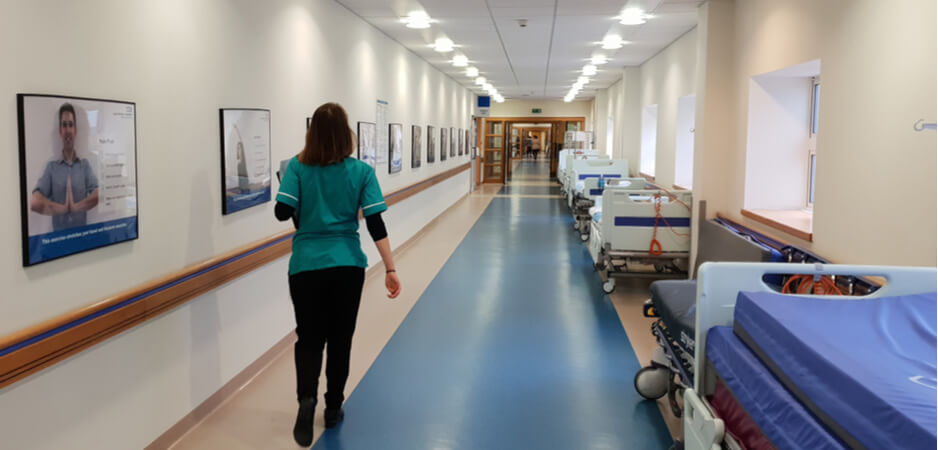Despite the incredible work that it does, the high demand for NHS services means the system is under constant pressure.
A recent commentary in The Lancet by Helen Epstein discusses research that identifies health improvements and longevity in countries that have transitioned to democracy. The article reveals how poor health outcomes are associated with autocratic regimes, which are less likely to invest in citizen welfare. It would appear that fair and free elections mean that elected leaders are held accountable to work for the greater good.
However, if democracy is good for health, it gives a green light to question how free societies are not necessarily free from complex institutional structures, where hierarchical systems can have adverse impacts on workers’ health.
The illuminating results of a longitudinal study published in 2004 by Sir Michael Marmot found that an organization undergoing continual processes of change also had detrimental impacts on some members of the workforce, particularly those people whose roles and positions were lower down the hierarchy. Essentially, they were exposed to more stress and increased ill health, a phenomenon that Marmot explored in his book, Status Syndrome.
If humanity is interested in finding ways of enabling greater social transformation in the 21st century, more emphasis needs to be placed on empowering people. Paul Barry Clarke’s book, Deep Citizenship, calls for a “radical democracy” where social and political participation encourages citizens to live deeply and take care of “self, others and world.” Deep citizenship could enliven our relationship and commitment to one another and the world. It is a perspective that aligns very well with the work of psychologist Arnold Mindell, whose work on deep democracy calls for our inner and outer experiences to be valued, as well as the viewpoints of people who identify with both mainstream and marginalized groups.
Deep democracy relies upon citizens having awareness of rank dynamics and how they are configured around difference and diversity within socio-cultural contexts. Having a clear understanding of rank helps societies learn about the potential damaging impacts of power and how it can be used consciously and constructively.
Being Savvy
In his book, Sitting in the Fire: Large Group Transformation Using Conflict and Diversity, Mindell points out that “hierarchy is the social structure of culture.” It means that citizens who are closer to mainstream attitudes, values and norms are generally more at ease with the prevailing status quo. This is in stark contrast to members of society who are marginalized and more likely to experience prejudice, such as sexism and racism, as well as other forms of discrimination in relation to disability, sexual orientation, religion, age, class, educational attainment and economic status, etc. In this way, established social norms can reinforce mainstream cultural hierarchies, resulting in a democracy vacuum, which can give rise to unconscious expressions of rank and power within societies.
A clear example of this was recently published in The Guardian, where three National Health Service (NHS) consultants from the EU spoke about the impact of Brexit on their lives and their dilemma about whether to stay or leave the UK. A consultant neurologist spoke about feeling like “a second-class citizen,” while another, a consultant cardiologist, mentioned the views of a well-educated neighbor, who said to him: “It will be OK. You’re white, Catholic and a doctor.” In the NHS, consultants rank highly, yet these examples reveal how rank dynamics are powerfully constellated in socio-political contexts.
Enlivening narratives about rank dynamics are found in stories of people who have confronted and overcome psychological and social barriers to empower self and others. The magnanimous Nelson Mandela exemplifies a person who earned great rank and power during his extraordinary life, from his time spent as a prisoner of the apartheid regime in South Africa to his life as president and inspired world leader. Mandela’s enduring legacy is one of a good-hearted democratic leader, who epitomized how to use power and position to make a difference in the world. In Sitting in the Fire, Mindell states that when rank is used well, it benefits and empowers both self and others. It is a worldview based on raising awareness and transforming attitudes and behaviors.
Rank dynamics are full of complexities. A good example of this is found in the story of a Tibetan refugee who arrived in the UK in the 1960s and worked as a hospital orderly in the NHS. In terms of the classic NHS hierarchy, his position would be relatively low, but it emerged that the refugee was Akong Rinpoche — a master of Tibetan meditation and medicine. In his spiritual tradition he was a person of high rank.
Deep Democracy
The NHS is based on the collective economic investment of UK citizens to maintain the health of the nation. Democratically elected governments are then trusted to look after this cherished institution. Yet despite the incredible work that it does, the high demand for NHS services means the system is under constant pressure. Worryingly, The Guardian revealed in March that there are currently 100,000 vacancies in NHS England. As a response to these ongoing systemic demands, some NHS trusts are providing staff wellbeing initiatives to help ease the burden on the workforce. However, the pressure on NHS staff is not all workload related.
The NHS Long Term Plan, published in January 2019, identified that many staff have reported experiences of abuse, bullying or harassment. The plan has aspirations to support and strengthen diverse and compassionate leadership at all levels of the organization to help retain staff and develop the workforce. In short, it wants staff to treat each other professionally and kindly. Yet an organization with high vacancy levels and many staff complaining of bullying points to a system that would benefit from understanding the potential impacts of rank dynamics.
In 2006, I wrote a peer-reviewed article for the Journal of Nursing Management on the subject of rank and relationship in the NHS. I drew upon a diverse range of literature to show how rank and status dynamics can be contributing factors in workplace stress. I also pointed out that awareness of rank could assist in the cultivation of productive working relationships. However, the NHS is a system with a complex hierarchical structure, including political influences.
I visited my NHS dentist today. He told me it was hard to recruit new staff. His practice already lost a top Bulgarian dentist. Others from EU 27 countries don’t want to work in UK cos of Brexit uncertainty & xenophobia. No emergency appointments til Aug! pic.twitter.com/0ASsnrFNwF
— Julie Ward MEP (@julie4nw) May 7, 2019
A Guardian reporter, Polly Toynbee, wrote a column in January 2016 about the then-health secretary, Jeremy Hunt, who reportedly sent a challenging memo to NHS Trust boards, threatening them with dismissal if they failed to balance their accounts without compromising care. This directive was sent at a time when austerity measures were causing some NHS trusts to struggle financially. It reveals the political pressures being placed on the NHS. However, David Lock, QC, writing a blog in The British Medical Journal, suggests that NHS management has a responsibility to “speak truth unto power.” It is an invitation to set a new precedent in the system as a whole. In this way, rank dynamics and deep democracy could be instrumental in transforming the NHS organizational hierarchy.
In his book titled The Leader’s 2nd Training, Arnold Mindell speaks about the need for “rank-conscious” individuals and organizations, which includes everyone learning about where they are “unconscious” of rank. It’s a participatory perspective that encourages personal, professional and systemic accountability for the various ways that authority and power are used.
In the context of traditional organizational life, the uses of authority and power are legitimized by the roles that people occupy within a given hierarchy, as noted by Julie Diamond in her aptly titled book, Power: A User’s Guide. She also notes that people who behave poorly can lose legitimacy, despite the authority they may have within their organization. Diamond underlines an important point about power in relation to rank — that it is contextual, which means it can pop up within and between various hierarchical networks, such as found in families, work-based environments and social groups, etc. She helpfully refers to the dynamism associated with high and low rank as “power in motion.”
Power dynamics always run the risk of escalating into crises. An example of this is found in a Guardian article that discusses the fallout from the Francis Report, where staff at Mid Staffordshire hospital indicated they feared the reactions of managers if they voiced concerns about substandard care. Rank dynamics appear to be a persistent problem in the NHS. For example, in March, an anesthetic registrar, Dr. Joanna Poole, spoke to The Guardian about how she has compiled a dossier of over 400 complaints by junior doctors, citing poor treatment and being treated in a “disposable way.”
If this is the experience of some junior doctors, it is not difficult to imagine the treatment of other staff lower down the organizational hierarchy. The same article indicates warnings from UK health think tanks, who suggest that devaluing staff will lead to more workforce vacancies in NHS England, rising to a predicted shortfall of 250,000 by 2030. This is an alarming forecast.
It is obvious that people are unlikely to be loyal to an organization that does not appear to care for them. Being harassed, overpowered, demotivated and burnt out is not a meaningful way to work or live. Disaffected staff will always find alternative ways of looking after themselves, either by signing off sick or leaving the organization. The needs of vulnerable staff struggling to cope are a systemic red flag. Between 2011-17, over 300 nurses in the UK committed suicide, a tragic statistic that is 23% above the national average. Clearly, a deep process of cultural empowerment and transformation is urgently needed in the NHS.
Empowerment
NHS leadership initiatives that advocate the effective use of power to lead, motivate and empower the workforce are already in existence. These ideas are based on principles and values that are ethical, moral and socially just. Similarly, Mindell’s work on rank and deep democracy is firmly rooted in values connected to social justice. His message would not be out of place in a document published by the NHS Institute for Innovation and Improvement, “The Power Of One, The Power Of Many,” which calls for health-care improvements inspired by ideas connected to social movements. The document refers to the story of Rosa Parks and her contribution to US civil rights activism.
Parks made a brave stance against racism, revealing how a marginalized woman in an oppressive social hierarchy was emboldened to “speak truth unto power.” Her hard-earned psychological and spiritual rank was forged in the daily struggles of living and surviving in an unjust system. Democratic leadership understands that such actions are potent indicators for deep change.
In their writings on the subject of new leaders, Daniel Goleman and colleagues outline how democratic leaders use emotional intelligence to influence and support collaboration in teams and also to manage conflict. Rank and deep democracy could be the difference to how the NHS engages systemic and cultural transformation. The following points could complement existing NHS initiatives to tackle bullying.
First of all, this can be done by cultivating an appreciation of the diverse ways that rank dynamics exist within self and society, especially in relation to mainstream values and people’s experiences of marginalization; second, by creating an understanding of how rank is communicated within teams and organizations, and how problematic rank dynamics can adversely impact the wellbeing of the workforce and the system as a whole; third, by encouraging awareness of rank dynamics within annual mandatory training days, linked to sessions on equality and diversity; finally, by supporting all grades of staff to integrate awareness of rank dynamics into their professional duties, as part of a fitness to practice initiative.
Deep democracy and rank dynamics could be powerfully aligned to the NHS nine leadership dimensions, which are outlined in the Healthcare Leadership Model. Such integration could create a sustainable foundation for transforming attitudes and behaviors in the NHS organizational hierarchy, which empowers all staff to work for the greater good. Perhaps the old saying, “Physician, heal thyself,” also applies to health-care systems?
The views expressed in this article are the author’s own and do not necessarily reflect Fair Observer’s editorial policy.
Support Fair Observer
We rely on your support for our independence, diversity and quality.
For more than 10 years, Fair Observer has been free, fair and independent. No billionaire owns us, no advertisers control us. We are a reader-supported nonprofit. Unlike many other publications, we keep our content free for readers regardless of where they live or whether they can afford to pay. We have no paywalls and no ads.
In the post-truth era of fake news, echo chambers and filter bubbles, we publish a plurality of perspectives from around the world. Anyone can publish with us, but everyone goes through a rigorous editorial process. So, you get fact-checked, well-reasoned content instead of noise.
We publish 3,000+ voices from 90+ countries. We also conduct education and training programs
on subjects ranging from digital media and journalism to writing and critical thinking. This
doesn’t come cheap. Servers, editors, trainers and web developers cost
money.
Please consider supporting us on a regular basis as a recurring donor or a
sustaining member.
Will you support FO’s journalism?
We rely on your support for our independence, diversity and quality.









Commenting Guidelines
Please read our commenting guidelines before commenting.
1. Be Respectful: Please be polite to the author. Avoid hostility. The whole point of Fair Observer is openness to different perspectives from perspectives from around the world.
2. Comment Thoughtfully: Please be relevant and constructive. We do not allow personal attacks, disinformation or trolling. We will remove hate speech or incitement.
3. Contribute Usefully: Add something of value — a point of view, an argument, a personal experience or a relevant link if you are citing statistics and key facts.
Please agree to the guidelines before proceeding.